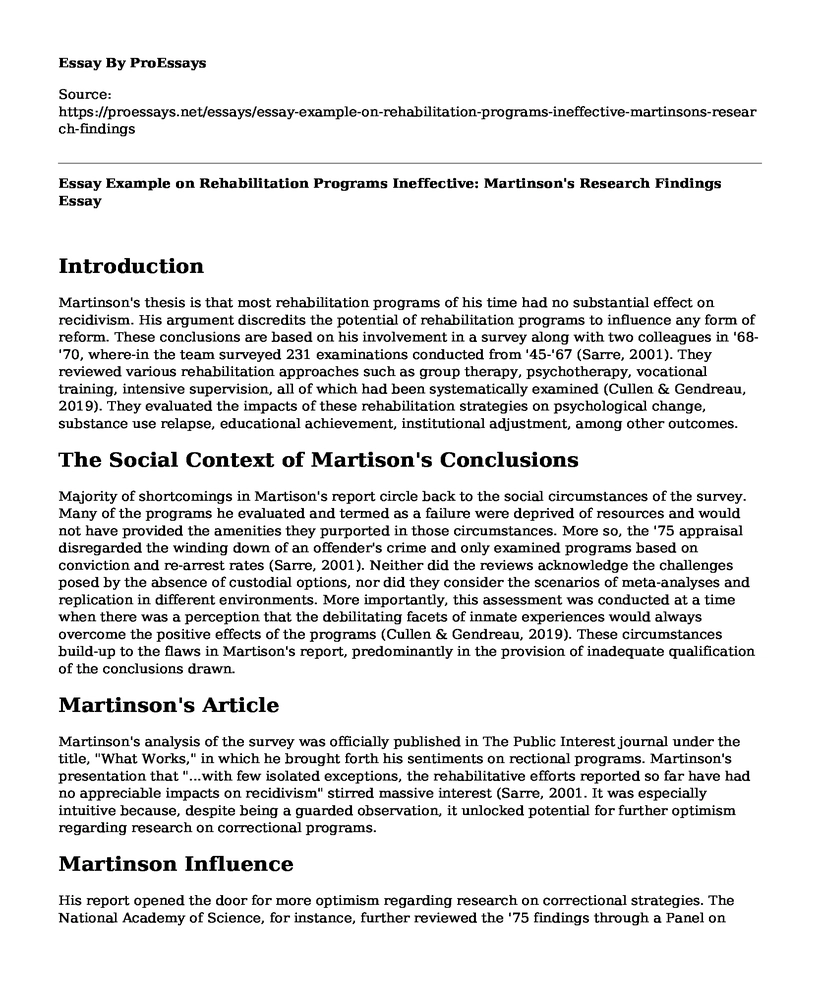Introduction
Martinson's thesis is that most rehabilitation programs of his time had no substantial effect on recidivism. His argument discredits the potential of rehabilitation programs to influence any form of reform. These conclusions are based on his involvement in a survey along with two colleagues in '68-'70, where-in the team surveyed 231 examinations conducted from '45-'67 (Sarre, 2001). They reviewed various rehabilitation approaches such as group therapy, psychotherapy, vocational training, intensive supervision, all of which had been systematically examined (Cullen & Gendreau, 2019). They evaluated the impacts of these rehabilitation strategies on psychological change, substance use relapse, educational achievement, institutional adjustment, among other outcomes.
The Social Context of Martison's Conclusions
Majority of shortcomings in Martison's report circle back to the social circumstances of the survey. Many of the programs he evaluated and termed as a failure were deprived of resources and would not have provided the amenities they purported in those circumstances. More so, the '75 appraisal disregarded the winding down of an offender's crime and only examined programs based on conviction and re-arrest rates (Sarre, 2001). Neither did the reviews acknowledge the challenges posed by the absence of custodial options, nor did they consider the scenarios of meta-analyses and replication in different environments. More importantly, this assessment was conducted at a time when there was a perception that the debilitating facets of inmate experiences would always overcome the positive effects of the programs (Cullen & Gendreau, 2019). These circumstances build-up to the flaws in Martison's report, predominantly in the provision of inadequate qualification of the conclusions drawn.
Martinson's Article
Martinson's analysis of the survey was officially published in The Public Interest journal under the title, "What Works," in which he brought forth his sentiments on rectional programs. Martinson's presentation that "...with few isolated exceptions, the rehabilitative efforts reported so far have had no appreciable impacts on recidivism" stirred massive interest (Sarre, 2001. It was especially intuitive because, despite being a guarded observation, it unlocked potential for further optimism regarding research on correctional programs.
Martinson Influence
His report opened the door for more optimism regarding research on correctional strategies. The National Academy of Science, for instance, further reviewed the '75 findings through a Panel on Research on Rehabilitative Techniques. Martinson's views were emphasized by the panel, which confirmed that they could not fully attest to a program that could be guaranteed to control the criminal behavior of offenders (Sarre, 2001). Martinson's work was a call for more intensive and conscious research on rehabilitation (Cullen, 2013).
Overall Conclusions on the "What Works?" Doctrine
The doctrine brings forth the issue that even research results and analyses are subject to socially constructed assumptions or views (Sarre, 2001). It awakens us to the need for questioning the social circumstances of subject samples in research, as well as concluding these surveys with respect to various social aspects.
References
Cullen, F. T. (2013). Rehabilitation: Beyond nothing works. Crime and Justice, 42(1), 299–376. https://doi.org/10.1086/670395
Cullen, F. T., & Gendreau, P. (2019). From nothing works to what works: changing professional ideology in the 21st century. Clinical Forensic Psychology and Law, 231–256. https://doi.org/10.4324/9781351161565-13
Sarre, R. (2001). Beyond' What Works?' A 25-year jubilee retrospective of Robert Martin's famous article. Australian & New Zealand Journal of Criminology, 34(1), 38–46. https://doi.org/10.1177/000486580103400103
Cite this page
Essay Example on Rehabilitation Programs Ineffective: Martinson's Research Findings. (2023, Aug 28). Retrieved from https://proessays.net/essays/essay-example-on-rehabilitation-programs-ineffective-martinsons-research-findings
If you are the original author of this essay and no longer wish to have it published on the ProEssays website, please click below to request its removal:
- Psychology of Well-Being and Happiness Paper Example
- Biological and Chemical Warfare and Weaponry Essay Example
- Article Analysis Essay on Nurse Burnout
- Paper Example on Discrimination Against Older Adults: Examining Ageism in Society
- Research Paper on American-Pakistani Males Open Up on Feminism In Their Culture
- Essay Example on Exploring Racism & Culture: A Movie About American Diversity
- Report Example on Immigration to the US: The Dreamers and the DREAM Act







